Tbilisi digital nomad guide 2021-2022 – that will be the topic of today’s article.
Before introducing this article, if you are interested in our core services which are expat financial, insurance and mortgages, you can contact me here.
The best time to consider your financial situation is when you are moving to a new country.
Introduction
The term “digital nomad” can be found everywhere today and is arguably one of the fastest-growing lifestyles of the past decade. Anyways, many of us can be still confused with the term ‘digital nomad’, long-term traveler, or online worker. What is a digital nomad? What is the definition of a nomad and how they live? If you’re as confused and curious as they are, read on!
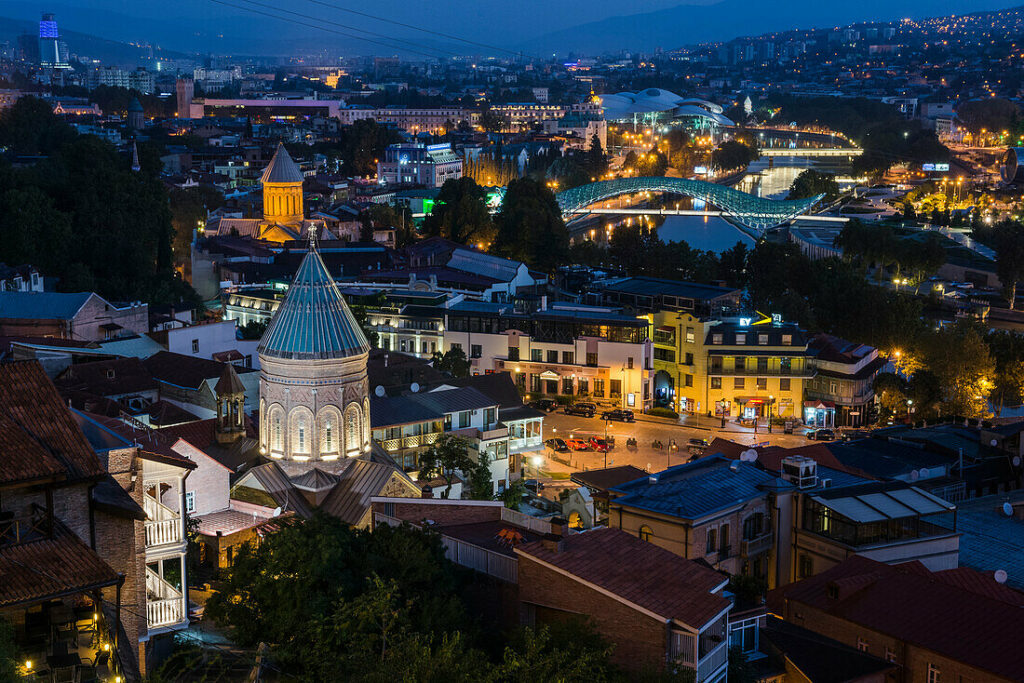
Before you get the answer of the “what is a digital nomad?” question, let’s first get acquainted with the term “nomad”. The meaning of a digital nomad in a more simplified way is a person who does not have a permanent location but rather moves from one place to another. There is no clear definition of how long you need to be “on the road,” or how fast you need to move, or where you need to go to be considered a nomad and not just a long-time traveler.
However, except for being travelers, digital nomads usually travel for a very long time, sometimes it can last their entire lives. During that time they have to make money along the way. They take local jobs, such as farm or hospitality jobs, so they can buy supplies and move elsewhere. Some people prefer to stay in certain places longer, the so-called “slow travelers”, some people move to the next place faster.
Nomads who do not work locally to live stable and travel, but work on the Internet, are called digital nomads. They use their laptops, smartphones, and tablets for location-independent work and thus make money. Thanks to their technology and the Internet, they can simply take their work with them wherever they go and work from hotel rooms, libraries, cafes, or coworking spaces. While all digital nomads work on the Internet, their work can vary greatly and can be divided into three categories:
Corporate remote worker
At the moment a lot of companies suggest their employees to work remotely. It doesn’t matter if the employee is sitting at home doing their job or traveling. Such remote work basically provides a stable and reliable income with the flexibility to choose your own workplace.
Freelancer
A digital nomadic freelancer does online work for one or more clients. Such jobs are often related to web design, social media management, or content writing. A freelancer can work from anywhere in the world if his clients agree that he is physically unavailable in their company. He often finds his clients on specific freelance platforms like Upwork or Fiverr.
Entrepreneur
Some digital nomads have startups and can run their entire business online. Others make money trading online services. And very few people manage to make a living by the nomadic way of life itself, such as travel bloggers or photographers.
Later in this article we will talk about life of digital nomads in one of the oldest cities – Tbilisi, Georgia.
Georgia, a country located on the east coast of the Black Sea. It borders Russia and was once part of the Soviet Union, and also borders Turkey, Armenia and Azerbaijan. Georgia is a country where you can still notices remnants of its Soviet past, usually it can be seen mainly in its architecture, infrastructure and food.
Although Georgian is the official language, Georgians speak several languages. Everyone who grew up in the Soviet Union was taught Russian, but in the fall the country opened up to Europe thanks to exchange programs, and now the younger generation mostly speaks English and German as a second language. Georgia uses Georgian Lari (GEL), which costs 0.32 Lari per US dollar.
Georgia is known for its wine and is recognized as one of the first countries to produce it. Besides the beautiful mountain ranges in the Caucasus, Georgia is rich in a mix of cuisine and historical values. From skiing to swimming in natural thermal springs, Georgia has everything for outdoor enthusiasts, as well as stylish city life in places like Batumi and Tbilisi.
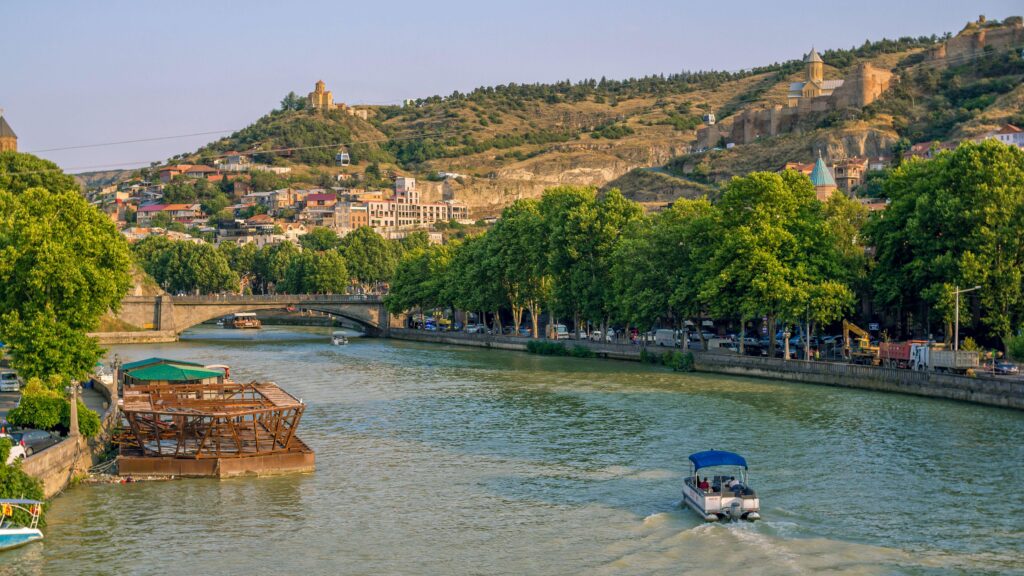
Georgia is a promising destination for digital nomads and already has an infrastructure specially designed for tourists and digital nomads, and Tbilisi is the best place in the country. Tbilisi truly reflects all the elements of Georgia’s past and future. The contrast of the former Soviet Union with Western modern ideas creates a very interesting contrast between old and new. The streets of Tbilisi are adorned with a stately style of Russian architecture that has become the aesthetics of Tbilisi’s hipster community.
Georgia is a country that invests in its future generations and has become very hospitable for tourism over the past few years. Despite the developed infrastructure, in more rural areas you will still see the traditional way of life in Georgia.
Georgian visa
Georgia is very hospitable to foreigners and most people believe that they do not need a visa to enter. In addition to the absence of a visa, citizens of 94 countries can stay in Georgia, work and live for 1 year without a visa. This is part of a campaign to open up to the world and encourage everyone to come and live in Georgia. To find out if you need a visa, visit the website of the Government of Georgia or seek advice from your embassy in Georgia. After one year, you will need to apply for a long-term visa. Your passport must be valid only for the period during which you plan to stay in Georgia. Most countries require you to have at least 6 months left in your passport before entering the country. If you do not need a visa to Georgia, then upon arrival you will be stamped, which will activate your 365 days.
You can enter Georgia only with an EU identity card and without a passport; however, it can sometimes cause problems depending on where you come from because there are no exit and entry stamps. This can be confusing at some borders, so it is advised to use a full passport or only use an EU ID when arriving from the issuing country.
Georgia does not recognize Taiwanese passport; therefore no one from Taiwan can enter Georgia. Georgia is the only country in the world that is doing this.
The best places to live in Tbilisi
Georgia is a very safe country to stay in as it has expanded its tourism industry and invested in infrastructure in recent years to provide hospitality to all foreigners. One of the most encouraging aspects of Georgia is that the police were modernized in the early 2000s due to uncontrolled corruption. This meant that the country started from scratch, recruiting and training people to work with a new and fair system. This means that corruption in the country has dropped significantly, resulting in a safe and welcoming environment for tourists.
Tbilisi as a whole is a great vacation destination and it is a dynamic city with a lot to offer. However, if you are looking for the best areas, you have several options. Based on safety, affordability, value for money and entertainment, here are a few neighborhoods in the city that are well suited for digital nomads. There are areas that are more suitable for the creative, artistic type, and there are areas that are better suited for the historian. There are many areas in Tbilisi to suit your needs and preferences. The population of Tbilisi is about 1.1 million and its total area is 280 square miles.
Abanotubani
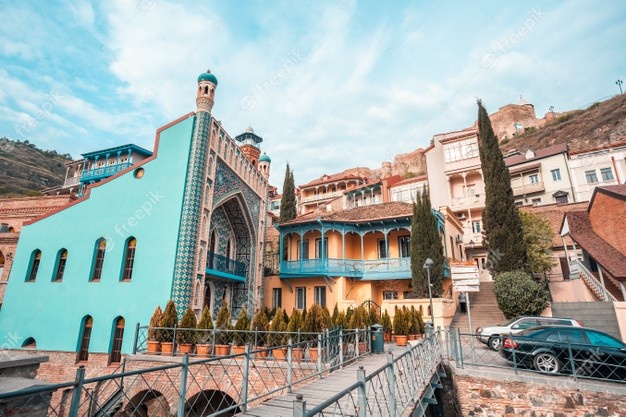
Housing is expensive here. But there are many designer lofts for crazy groups of friends who love to relax in beauty. Another disadvantage is that this is the most tourist area, not suitable for seal families.
There are many pluses:
- Abanotubani is the very center of the city, there is the maximum concentration of iconic and historical sights of Tbilisi.
- The area itself is the sweet bubaleh of my heart. Domed roofs of sulfur baths, Narikala fortress, a waterfall and houses with wooden balconies – Instragram will get tired of you.
- It is only 5 minutes walk from Abanotubani to Freedom Square and Rustaveli Avenue. There’s a nice little Rike park across the river.
Avlabari
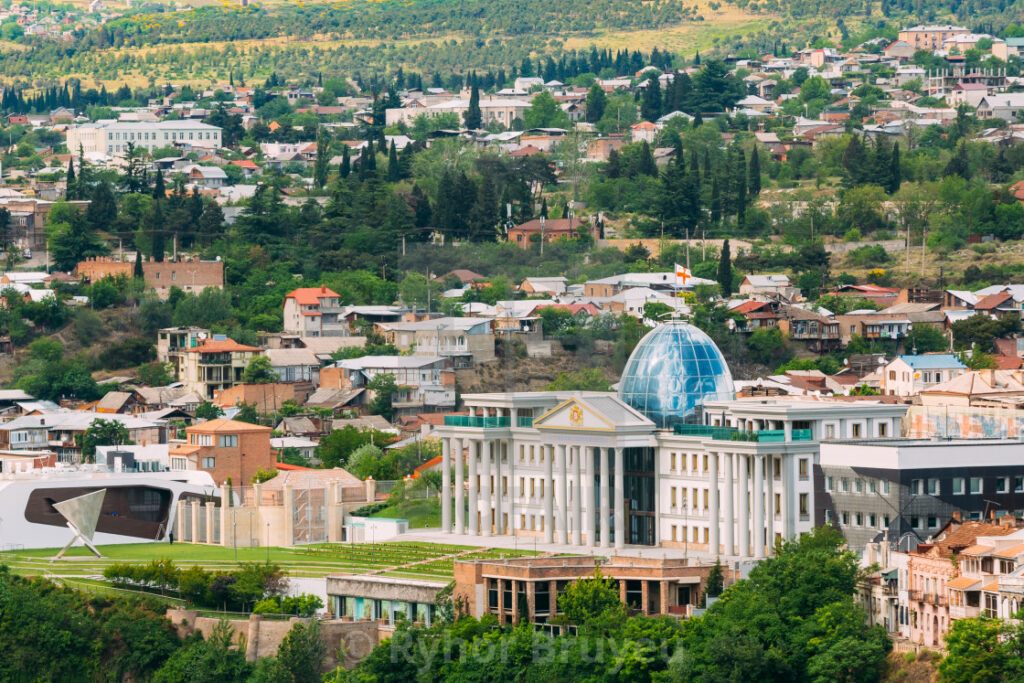
The oldest district of the capital. From which the first minus immediately follows – rather dilapidated housing. There are often hotels and apartments with poor sewerage systems.
Advantages:
- Avlabari was formerly inhabited by Armenians, which makes this part of the city completely unique.
- Near Metekhi Church, Holy Trinity Cathedral and Armenian Theater.
- There are many places with local wine in the vicinity.
- The area is more residential and, accordingly, less touristy, while being close to the city center.
Mtatsminda
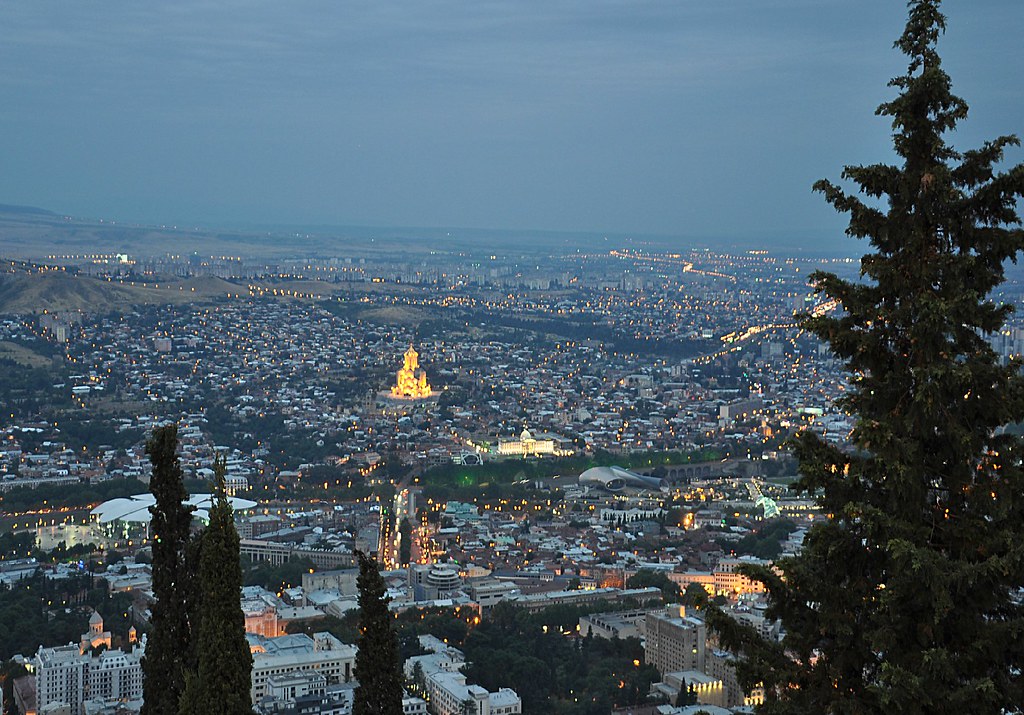
Mtatsminda is the largest district of Tbilisi. It is named after Mount Mtatsminda, one of the key attractions of the city. When you get to Rustaveli Avenue, start your hike uphill and wander along its steep climbs to the Funicular.
Although the area is not a tourist area, housing prices can be slightly high due to its proximity to the city center.
And also:
- The most European hotels are collected here.
- Close to Rustaveli street.
- And close to the metro and other transport.
- The only downside is noise. But if you yourself came to Georgia to make a lot of noise, then I do not see any disadvantages in this area for you.
Cheap Accommodations in Tbilisi
For a smaller budget, it is better to use sites like Airbnb as there will be little or no real estate agent fees and cheaper options.
Some of the best hostels in Tbilisi are Fabrika, Vagabond B&B, Envoy Hostel and Woodmood. At Hostel World you can find beds in dorms for as little as US $ 7 per night, and they can go up to around US $ 15. For around $ 14-40, you can get private rooms in hostels. Many offer different types of rooms.
While these are relatively inexpensive options for short stays, you may find that renting an apartment for a longer period is more efficient and cheaper in the long run.
Using cowering and colliding places like Fabrika or Lokal can be a very good way to reduce the cost of living. Lokal offers packages starting with the most basic package called The Adventurer, which costs around $ 12 a night, which gives you a bed in a 4-bed dorm, access to a collaboration area with a free hot desk, access to collaboration. activities and use of a joint kitchen and living room. They offer twin rooms starting at $ 25 per night, so if you’re a digital nomad couple, this might be a good budget option for you.
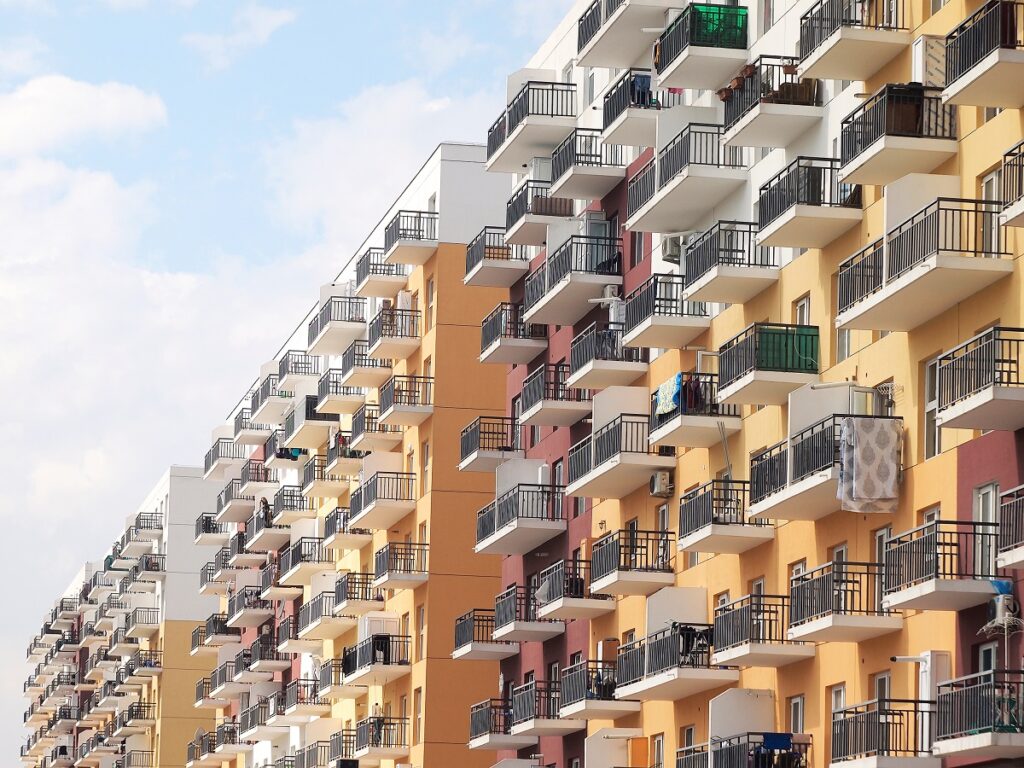
Culture and food in Tbilisi
Georgian cuisine consists mainly of hearty and rich dishes that have evolved from traditional cooking methods and have remained true to their roots. The cuisine varies depending on the region you are in as Georgian cuisine mainly uses seasonal products grown in Georgia.
In Georgia, be sure to try khachapuri and khinkali; these are two dishes that Georgia is famous for.
Khinkali are dumplings that contain a soup or stew-based filling. Traditionally, it was boiled or steamed and then eaten by hand and dipped in sour cream. Khinkali is shaped like an onion or turnip, as the idea is that you take it by the stem. You usually take a bite and then drink the soup and eventually eat the leftover dumplings with the leftover meat and vegetables.
Khachapuri is a dairy-rich pastry that can be found almost everywhere in Georgia. Khachapuri is essentially a boat-shaped tortilla that is then filled with cheese and baked. Sometimes the egg is cracked on top, and sometimes it is served with butter for decoration. This rich dish is a staple food and is traditionally eaten as a common dish. You eat it by breaking off the crispy sides and dipping them into a deliciously sticky cheese center.
Georgia is famous for its wine, so you should definitely try their red wine when you are there. In 2017, a new discovery was made: qvevri was found at an archaeological site that dates back about 8,000 years ago. These testimonies confirm the fact that Georgians were the first to start producing wine in this way of storage in qvevri, which are clay pots.
Finally, if you’re looking for a healthy sweet treat, Tklapi and Churchkhela are two traditional fruit treats. Tklapi is essentially like the peel of a fruit: the fruit is turned into pulp and then flattened into pancake-like forms and left in the sun to dry. Churchkhela are fruits such as grapes and nuts that are strung on a string and dipped in honey and fruit juices to create a sweet shell. You will find both in many markets throughout Georgia.
When it comes to restaurants, there are many places to eat in Tbilisi with both traditional and modern cuisine. If you are hungry for fast food, then you have McDonalds, Burger King and KFC, as well as a wide selection of local fast food restaurants where you can eat for as little as $ 1. One of the most popular street food staples is shvarma, which is similar to a shish kebab.
Traditional restaurants in Tbilisi offer a wide variety of local dishes and a truly Georgian experience, so if you are looking for something special, Midamo Restaurant might be a good place to be. This is one of the best restaurants in Tbilisi, offering some of the best Georgian food in the country.
Tbilisi has also seen a wave of new restaurants experimenting with different cuisines. Most of them were created by young entrepreneurs who are taking the cuisine in Georgia to a new level.
This includes a wide variety of vegan and vegetarian restaurants, some of the best vegan restaurants being the humus bar, Kiwi Vegan Café, Mama Terra Veggie Corner, Muhudo, and Leila. They all offer vegan and vegetarian options, as well as other options that suit certain dietary requirements or allergy sufferers.
You are sure to find something in Tbilisi to suit your dietary needs, and it is a great place for those who like to experiment with new foods.
Transportation in Tbilisi
Public transport in Tbilisi is very convenient and affordable, and not everyone can afford a private car. A bus or metro ride costs 50 tetri. A minibus costs 80 tetri (20 rubles), but every second trip costs 65 tetri. Everywhere you can pay with a bank card by placing it on the validator. There is also a rechargeable transport card, which is valid in all types of transport, including minibuses. It can be bought for 2 GEL and then topped up in PAY-boxes.
Yandex.Taxi is very popular in Tbilisi, it is the cheapest. The average check in the city is 3-5 GEL. You can, of course, catch a bombila, but, as a rule, it will be a grandpa in a very old car, which will beat a high price even for local, not like tourists: 10-15 lari.
Parking in the city, in my opinion, is not enough, but there are a lot of cars. There are almost no equipped roads for pedestrians. Parking in the center is paid, you can buy an unlimited subscription for a year for 50 GEL. The fine for unpaid parking is 10 GEL.
Entertainment in Tbilisi
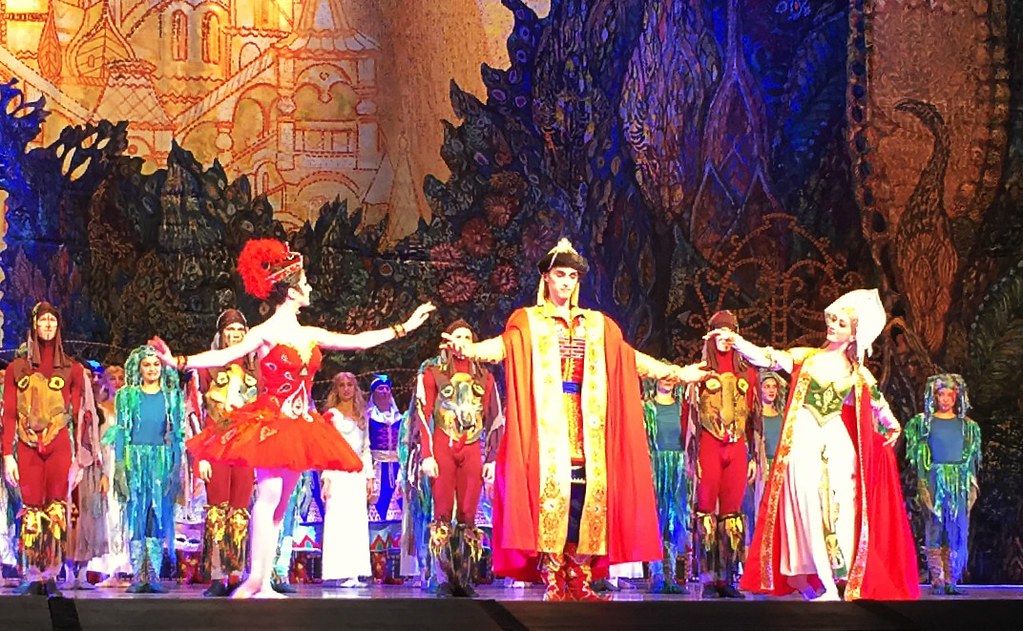
Going to a restaurant is a traditional and favorite pastime for Georgians. They sit for a long time in large companies, such a noisy crowd. It is worth it inexpensively. The average bill for two in a simple restaurant without pathos with khinkali or shashlik will be 40-50 lari (1,000-1,250 rubles) – with wine, of course. There are also very popular, status restaurants, where dinner will cost about 100 lari (2,500 rubles). Gratuities – from 5 to 15% – are included in the bill. Moreover, almost no one leaves.
Every Wednesday in almost all cinemas a ticket for any show costs 5 lari (125 rubles). They, of course, need to be bought in advance: there are a lot of people who want to go to the movies at a cheaper price. On other days, a ticket for a day session costs 5–7 lari (125–175 rubles), for an evening session – 10–15 lari (250–375 rubles). Films in all cinemas are shown in Georgian, Russian and English.
For 10 lari (250 rubles) you can go to the famous Rezo Gabriadze Puppet Theater. There performances are in Georgian, but if necessary, the audience is given headphones with Russian or English translation.
In good weather, residents of Tbilisi love to walk. On summer evenings, when the heat subsides, the city revives, parks fill up, and locals mingle with tourists on the streets of the old city. In the summer, locals always go to the sea in Batumi, to visit relatives in other cities and villages. In winter, it is customary to go to Gudauri to ski.
To sum up
We hope this article helped you to understand who is a digital nomad, how these people live and work, and how their lives are passing. If true, being a “working-traveler” is a very interesting experience. You get the 2 in 1 package, you travel all over the world and you also earn money during that time.
Georgia is a very great place to start your digital nomad career, it is a very rich and amazing country, and also cheaper for your first steps. Tbilisi is a picturesque and old city where you will never get bored, the youth is alive and the people are really kind so you can easily make friends there. Even if you are not a nomad in Tbilisi, just visit once and you can never forget that city.


